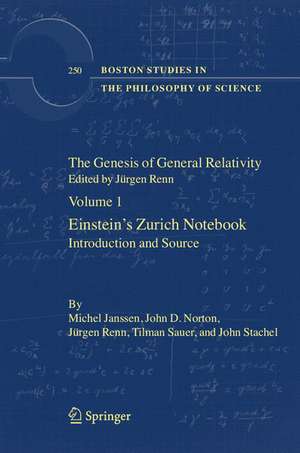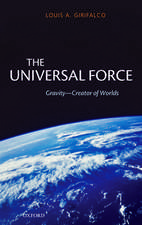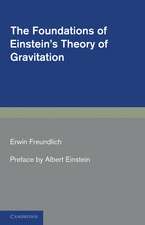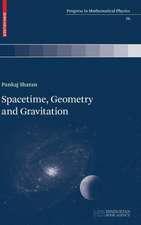The Genesis of General Relativity: Sources and Interpretations: Boston Studies in the Philosophy and History of Science, cartea 250
Editat de Jürgen Rennen Limba Engleză Hardback – 16 feb 2007
Din seria Boston Studies in the Philosophy and History of Science
- 18%
 Preț: 944.19 lei
Preț: 944.19 lei - 15%
 Preț: 646.75 lei
Preț: 646.75 lei - 15%
 Preț: 646.75 lei
Preț: 646.75 lei - 15%
 Preț: 699.28 lei
Preț: 699.28 lei - 18%
 Preț: 736.50 lei
Preț: 736.50 lei -
 Preț: 500.01 lei
Preț: 500.01 lei - 15%
 Preț: 643.16 lei
Preț: 643.16 lei - 15%
 Preț: 650.69 lei
Preț: 650.69 lei - 15%
 Preț: 634.18 lei
Preț: 634.18 lei - 15%
 Preț: 642.68 lei
Preț: 642.68 lei -
 Preț: 391.40 lei
Preț: 391.40 lei -
 Preț: 383.33 lei
Preț: 383.33 lei - 18%
 Preț: 944.19 lei
Preț: 944.19 lei - 18%
 Preț: 955.56 lei
Preț: 955.56 lei - 15%
 Preț: 643.65 lei
Preț: 643.65 lei -
 Preț: 392.75 lei
Preț: 392.75 lei - 18%
 Preț: 1229.10 lei
Preț: 1229.10 lei - 18%
 Preț: 1238.23 lei
Preț: 1238.23 lei - 18%
 Preț: 951.29 lei
Preț: 951.29 lei - 18%
 Preț: 1223.25 lei
Preț: 1223.25 lei - 18%
 Preț: 1225.79 lei
Preț: 1225.79 lei - 18%
 Preț: 1226.42 lei
Preț: 1226.42 lei - 18%
 Preț: 1236.82 lei
Preț: 1236.82 lei - 15%
 Preț: 644.49 lei
Preț: 644.49 lei - 18%
 Preț: 1231.78 lei
Preț: 1231.78 lei - 15%
 Preț: 644.30 lei
Preț: 644.30 lei - 18%
 Preț: 957.62 lei
Preț: 957.62 lei - 18%
 Preț: 1222.49 lei
Preț: 1222.49 lei - 18%
 Preț: 947.50 lei
Preț: 947.50 lei - 18%
 Preț: 1833.95 lei
Preț: 1833.95 lei - 18%
 Preț: 1227.99 lei
Preț: 1227.99 lei - 18%
 Preț: 947.35 lei
Preț: 947.35 lei
Preț: 5314.06 lei
Preț vechi: 6480.56 lei
-18% Nou
Puncte Express: 7971
Preț estimativ în valută:
1016.82€ • 1064.51$ • 841.37£
1016.82€ • 1064.51$ • 841.37£
Carte tipărită la comandă
Livrare economică 08-22 aprilie
Preluare comenzi: 021 569.72.76
Specificații
ISBN-13: 9781402039997
ISBN-10: 1402039999
Pagini: 619
Ilustrații: XXIX, 2099 p. In 4 volumes, not available separately.
Dimensiuni: 155 x 235 x 107 mm
Greutate: 3.92 kg
Ediția:2007
Editura: SPRINGER NETHERLANDS
Colecția Springer
Seria Boston Studies in the Philosophy and History of Science
Locul publicării:Dordrecht, Netherlands
ISBN-10: 1402039999
Pagini: 619
Ilustrații: XXIX, 2099 p. In 4 volumes, not available separately.
Dimensiuni: 155 x 235 x 107 mm
Greutate: 3.92 kg
Ediția:2007
Editura: SPRINGER NETHERLANDS
Colecția Springer
Seria Boston Studies in the Philosophy and History of Science
Locul publicării:Dordrecht, Netherlands
Public țintă
ResearchCuprins
to Volumes 1 and 2: The Zurich Notebook and the Genesis of General Relativity.- Classical Physics In Disarray.- The First Two Acts.- Pathways out of Classical Physics.- Einstein's Zurich Notebook.- A Commentary on the Notes on Gravity in the Zurich Notebook.- What was Einstein's “Fateful Prejudice”?.- What did Einstein know and when did He know it? A Besso Memo Dated August 1913.- Untying the Knot: how Einstein Found his way Back to Field Equations Discarded in the Zurich Notebook.- The Gravitational Force between Mechanics and Electrodynamics.- Gravitation in the Twilight of Classical Physics: An Introduction.- The Third Way to General Relativity: Einstein and Mach in Context.- Gravitation.- Considerations on Gravitation.- Absolute or Relative Motion?.- On Absolute and Relative Motion.- An Astronomical Road to a New Theory of Gravitation.- The Continuity Between Classical and Relativistic Cosmology in the Work of Karl Schwarzschild.- Things at Rest in the Universe.- A New Law of Gravitation Enforced by Special Relativity.- Breaking in the 4-Vectors: The Four-Dimensional Movement in Gravitation, 1905–1910.- On The Dynamics of the Electron (Excerpts).- Mechanics and the Relativity Postulate.- Old and New Questions in Physics (Excerpt).- The Problem of Gravitation as a Challenge for the Minkowski Formalism.- The Summit Almost Scaled: Max Abraham as a Pioneer of a Relativistic Theory of Gravitation.- On the Theory of Gravitation.- The Free Fall.- A New Theory of Gravitation.- Recent Theories of Gravitation.- A Field Theory of Gravitation in the Framework of Special Relativity.- Einstein, Nordström, and the Early Demise of Scalar, Lorentz Covariant Theories of Gravitation.- The Principle of Relativity and Gravitation.- Inertial and Gravitational Mass In RelativisticMechanics.- On the Theory of Gravitation from the Standpoint of the Principle of Relativity.- On the Present State of the Problem of Gravitation.- From Heretical Mechanics to a New Theory of Relativity.- Einstein and Mach's Principle.- On the Relativity Problem.- Ether and the Theory of Relativity.- From an Electromagnetic Theory of Matter to a New Theory of Gravitation.- Mie's Theories of Matter and Gravitation.- Foundations of a Theory of Matter (Excerpts).- Remarks Concerning Einstein's Theory of Gravitation.- The Principle of the Relativity of the Gravitational Potential.- The Momentum-Energy Law in the Electrodynamics of Gustav Mie.- Including Gravitation in a Unified Theory of Physics.- The Origin of Hilbert's Axiomatic Method1.- Hilbert's Foundation of Physics: From a Theory of Everything to a Constituent of General Relativity.- Einstein Equations and Hilbert Action: What is Missing on Page 8 of the Proofs for Hilbert's First Communication on the Foundations of Physics?1.- The Foundations of Physics..- The Foundations of Physics (First Communication).- The Foundations of Physics (Second Communication).- From Peripheral Mathematics to a New Theory of Gravitation.- The Story of Newstein or: Is Gravity Just Another Pretty Force?.- On the Relation of Non-Euclidean Geometry to Extension Theory.- Notion of Parallelism on a General Manifold and Consequent Geometrical Specification of the Riemannian Curvature (Excerpts).- Purely Infinitesimal Geometry (Excerpt).- The Dynamics of Continuous Media and the Notion of an Affine Connection on Space-Time.
Recenzii
From the reviews:
These volumes prove that to Wittgenstein’s saying that "Genius is what makes us forget skill" ought to be added the statement "when viewing the finished product." Genius is also the ability to master the available resources and techniques and to synthesize them in a manner that overwhelms. The volumes are the product of a remarkable cooperative effort on the part of five of the most distinguished Einstein scholars. They deciphered and analyzed the extended research notes that Einstein made from 1912 to 1915 in his struggle to arrive at the final formulation of his theory of general relativity. In doing so they have given us deep new insights on Einstein’s creativity and on creativity in general, on context, on the role of past resources and expertise, and on the function of analogies. Their researches, observations and commentary have also made us think anew of the concept of a scientific revolution. Their splendid work is surely one of the most important and seminal scholarly accomplishments of recent times.
S.S. Schweber, Brandeis University, USA
"The publication of The Genesis of General Relativity marks the outcome of 10 years of research into the origins of Einstein’s General Relativity Theory … . It provides a comprehensive study and in-depth analysis of how the work of Albert Einstein and his contemporaries changes our understanding of space, time and gravitation. … At the center of this reconstruction, is a commentary of Einstein’s unpublished research notes, so-called ‘Zurich Notebook’, presented in their entirety for the first time." (Renn Jürgen, www.physorg.com, February, 2007)
These volumes are the result of over two decades of effort, by most of the
leading scholars in the field, to understand the process that culminated in
1915 and 1916 in Einstein’s publication of the general theory of relativity.
In addition to relativity physicists theproject involved, both individually
and more frequently collaboratively, historians and philosophers of science.
The central objective was, through this richly documented case study, to
identify universal features of the epistemological transformation that the
authors have called a “Copernican process”: How is it that heuristic guides
can render conceptual changes that invalidate their use? This dynamical
transmutation is firmly rooted in received societal and disciplinary scientific
knowledge. In the particular case under study here, most relativists will
probably have little trouble rejecting the mistaken popular notion that Einstein
was an isolated genius, creating his new world through shear inspired
imagination... Donald Salisbury, July 2008
To read more of this review - paste this link into your browser.
http://arxiv1.library.cornell.edu/abs/0807.3706v1
These volumes prove that to Wittgenstein’s saying that "Genius is what makes us forget skill" ought to be added the statement "when viewing the finished product." Genius is also the ability to master the available resources and techniques and to synthesize them in a manner that overwhelms. The volumes are the product of a remarkable cooperative effort on the part of five of the most distinguished Einstein scholars. They deciphered and analyzed the extended research notes that Einstein made from 1912 to 1915 in his struggle to arrive at the final formulation of his theory of general relativity. In doing so they have given us deep new insights on Einstein’s creativity and on creativity in general, on context, on the role of past resources and expertise, and on the function of analogies. Their researches, observations and commentary have also made us think anew of the concept of a scientific revolution. Their splendid work is surely one of the most important and seminal scholarly accomplishments of recent times.
S.S. Schweber, Brandeis University, USA
"The publication of The Genesis of General Relativity marks the outcome of 10 years of research into the origins of Einstein’s General Relativity Theory … . It provides a comprehensive study and in-depth analysis of how the work of Albert Einstein and his contemporaries changes our understanding of space, time and gravitation. … At the center of this reconstruction, is a commentary of Einstein’s unpublished research notes, so-called ‘Zurich Notebook’, presented in their entirety for the first time." (Renn Jürgen, www.physorg.com, February, 2007)
These volumes are the result of over two decades of effort, by most of the
leading scholars in the field, to understand the process that culminated in
1915 and 1916 in Einstein’s publication of the general theory of relativity.
In addition to relativity physicists theproject involved, both individually
and more frequently collaboratively, historians and philosophers of science.
The central objective was, through this richly documented case study, to
identify universal features of the epistemological transformation that the
authors have called a “Copernican process”: How is it that heuristic guides
can render conceptual changes that invalidate their use? This dynamical
transmutation is firmly rooted in received societal and disciplinary scientific
knowledge. In the particular case under study here, most relativists will
probably have little trouble rejecting the mistaken popular notion that Einstein
was an isolated genius, creating his new world through shear inspired
imagination... Donald Salisbury, July 2008
To read more of this review - paste this link into your browser.
http://arxiv1.library.cornell.edu/abs/0807.3706v1
Textul de pe ultima copertă
This four-volume work represents the most comprehensive documentation and study of the creation of general relativity; one of the fundamental physical theories of the 20th century. It comprises key sources from Einstein and others who from the late 19th to the early 20th century contributed to this monumental development. Some of these sources are presented here in translation for the first time. Einstein’s famous Zurich notebook, which documents the pivotal steps toward general relativity, is reproduced here for the first time and transcribed in its entirety. The volumes offer detailed commentaries and analyses of these sources that are based on a close reading of these documents supplemented by interpretations by the leading historians of relativity. All in all, the facets of this work, based on more than a decade of research, combine to constitute one of the most in-depth studies of a scientific revolution ever written.
Caracteristici
The most in-depth study of the major scientific revolution of the 20th century Einstein’s 1912 Zurich notebook for the first time published in facsimile and transcript and commented on by today’s major historians of science Additional sources on the genesis of General Relativity to appear in English translation for the first time Contributions that provide access for non-specialists Includes supplementary material: sn.pub/extras















